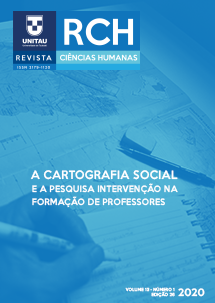(ENTRE)VISTAS E OLHARES CALEIDOSCÓPICOS: A CARTOGRAFIA SOCIAL NA FORMAÇÃO DE PROFESSORES/AS
DOI:
https://doi.org/10.32813/2179-1120.2020.v13.n1.a579Resumo
A cartografia social emerge contemporaneamente como estratégia metodologia em várias abordagens científicas, produzindo rupturas nos modos de fazer pesquisa abrindo espaço para processos investigativos que delineiam uma nova concepção de ciência. Interessa-nos aqui o âmbito das teorias pós-críticas e pós-estruturalistas. A entrevistada, a Professora Inez Carvalho, traz valiosas contribuições para caracterizar o ato de cartografar nessas perspectivas, especificando sua diferença em relação a outros modos de fazer pesquisa em Ciências Humanas, especialmente na ciência da educação. A entrevistada nos dá pistas de como o pesquisador cartógrafo desenvolve o processo metodológico na sua relação participante com o objeto a ser cartografado, uma vez que esse tipo de investigação implica em uma proposta de pesquisa-intervenção – pesquisa-formação. Ainda, sugere contribuições dessa concepção e prática, visto que essa outra lógica de pesquisar, formar – cartografar se configura como um modo de produzir conhecimentos e intervir na realidade pesquisada.
Métricas
Downloads
Publicado
Como Citar
Edição
Seção
Licença
Copyright (c) 2020 Revista Ciências Humanas

Este trabalho está licenciado sob uma licença Creative Commons Attribution 4.0 International License.
As publicações da Revista Ciências Humanas estão registradas sob a licença Creative Commons Attribution CC-BY.
1. Os conteúdos dos trabalhos são de exclusiva responsabilidade de seu autor.
2. É permitida a reprodução total ou parcial dos trabalhos publicados na Revista, desde que citada a fonte.
3. Ao submeterem seus trabalhos à Revista os autores certificam que os mesmos são de autoria própria e inéditos (não publicados em qualquer meio digital ou impresso).
4. Os direitos autorais dos artigos publicados na Revista são do autor, com direitos de primeira publicação reservados para este periódico.
5. Para fins de divulgação, a Revista poderá replicar os trabalhos publicados nesta revista em outros meios de comunicação como, por exemplo, redes sociais (Facebook, Academia.Edu, etc).
6. A Revista é de acesso público, portanto, os autores que submetem trabalhos concordam que os mesmos são de uso gratuito.
7. Constatando qualquer ilegalidade, fraude, ou outra atitude que coloque em dúvida a lisura da publicação, em especial a prática de plágio, o trabalho estará automaticamente rejeitado.
8. Caso o trabalho já tenha sido publicado, será imediatamente retirado da base da revista, sendo proibida sua posterior citação vinculada a ela e, no número seguinte em que ocorreu a publicação, será comunicado o cancelamento da referida publicação. Em caso de deflagração do procedimento para a retratação do trabalho, os autores serão previamente informados, sendo-lhe garantido o direito à ampla defesa.
9. Os dados pessoais fornecidos pelos autores serão utilizados exclusivamente para os serviços prestados por essa publicação, não sendo disponibilizados para outras finalidades ou a terceiros.





